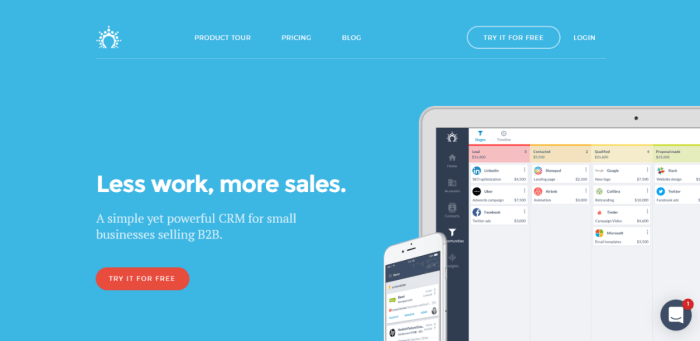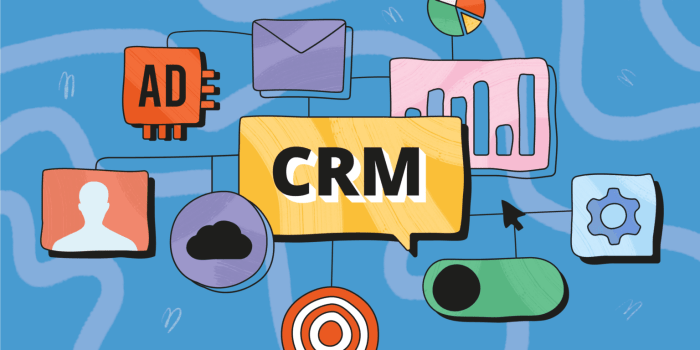Sales crm software for small business – In today’s competitive business landscape, efficient customer relationship management (CRM) is paramount, especially for small businesses. A robust sales CRM software can be the difference between struggling to stay afloat and experiencing significant growth. This comprehensive guide delves into the world of sales CRM software tailored for small businesses, exploring its benefits, features, selection process, and implementation strategies.
We’ll also address common questions and concerns to help you make an informed decision.

Source: solutionsuggest.com
Understanding the Importance of Sales CRM for Small Businesses
Small businesses often operate with limited resources, making efficient use of time and resources crucial. A sales CRM software streamlines various aspects of the sales process, automating tasks, improving organization, and ultimately boosting sales productivity. This translates to:
- Improved Lead Management: Centralized storage of all lead information, enabling better tracking and follow-up.
- Enhanced Sales Pipeline Visibility: Real-time insights into the sales pipeline, allowing for better forecasting and resource allocation.
- Increased Sales Productivity: Automation of repetitive tasks, freeing up time for more strategic sales activities.
- Stronger Customer Relationships: Personalized communication and targeted marketing based on customer data.
- Improved Reporting and Analytics: Data-driven insights to identify areas for improvement and optimize sales strategies.
- Better Collaboration: Seamless information sharing among sales team members, fostering better teamwork.
Key Features of a Sales CRM for Small Businesses
While features vary across different CRM systems, several core functionalities are essential for small businesses:
Contact Management, Sales crm software for small business
A robust contact management system is the cornerstone of any CRM. This includes the ability to store and organize customer information, including contact details, communication history, and purchase history. Effective search and filtering capabilities are crucial for quick access to relevant information.
Lead Management and Tracking
Efficient lead management involves capturing leads from various sources (website forms, social media, etc.), qualifying them based on predefined criteria, and tracking their progress through the sales pipeline. Automation features, such as automated email sequences, can significantly improve lead nurturing.
Sales Pipeline Management
Visualizing the sales pipeline provides a clear overview of the sales process, allowing for better forecasting and identification of potential bottlenecks. This feature usually involves customizable stages, progress tracking, and reporting capabilities.

Source: snov.io
Reporting and Analytics
Data-driven decision-making is critical for growth. A good CRM provides comprehensive reporting and analytics features, offering insights into sales performance, lead conversion rates, and other key metrics. Customizable dashboards allow for personalized views of relevant data.
Integration with Other Tools
Seamless integration with other business tools, such as email marketing platforms, accounting software, and e-commerce platforms, is crucial for a streamlined workflow. This eliminates data silos and ensures data consistency.
Customer Support and Service Features (Optional but Beneficial)
Some CRMs offer integrated customer support features, allowing for efficient ticket management and tracking of customer interactions. This can be particularly useful for small businesses that handle customer service directly.
Choosing the Right Sales CRM for Your Small Business
Selecting the right CRM involves careful consideration of several factors:

Source: rkinfotechindia.com
- Budget: CRMs range from free options to enterprise-level solutions. Choose a solution that aligns with your budget and anticipated needs.
- Scalability: Consider the future growth of your business and select a CRM that can scale to accommodate your expanding needs.
- Ease of Use: Opt for a user-friendly interface that is easy for your team to learn and use effectively. Avoid overly complex systems.
- Features: Prioritize the features that are most important to your business. Avoid paying for features you won’t use.
- Integrations: Ensure the CRM integrates with your existing business tools to avoid data silos and streamline workflows.
- Customer Support: Choose a provider that offers reliable customer support in case you encounter any issues.
Implementing Your Sales CRM: A Step-by-Step Guide
Successful CRM implementation involves a phased approach:
- Data Migration: Import existing customer data into the new CRM system. Ensure data accuracy and consistency.
- User Training: Provide comprehensive training to your sales team on how to use the CRM effectively.
- Process Optimization: Adapt your sales processes to leverage the CRM’s capabilities. Automate tasks where possible.
- Ongoing Monitoring and Optimization: Regularly monitor the CRM’s performance and make adjustments as needed to maximize its effectiveness.
Frequently Asked Questions (FAQ)
- Q: What is the best CRM for small businesses? A: The “best” CRM depends on your specific needs and budget. Consider factors like ease of use, features, and integrations when making your decision. Research popular options like HubSpot CRM, Zoho CRM, and Salesforce Sales Cloud (though Salesforce can be pricier for smaller businesses).
- Q: How much does sales CRM software cost? A: Costs vary widely depending on the features, provider, and number of users. Some offer free plans with limited features, while others charge monthly or annual subscriptions.
- Q: How long does it take to implement a sales CRM? A: Implementation time varies depending on the complexity of the CRM and the size of your business. It can range from a few weeks to several months.
- Q: Can I use a sales CRM on my mobile device? A: Most modern CRMs offer mobile apps, allowing you to access your data and manage your sales activities on the go.
- Q: What are the benefits of using a cloud-based CRM? A: Cloud-based CRMs offer accessibility from anywhere with an internet connection, automatic updates, and scalability.
Resources
Conclusion: Sales Crm Software For Small Business
Investing in the right sales CRM software is a strategic move for any small business looking to improve efficiency, boost sales, and enhance customer relationships. By carefully considering your needs, selecting the appropriate features, and implementing the system effectively, you can unlock the full potential of your sales team and drive significant growth. Remember to choose a system that aligns with your budget, current processes, and future scalability needs.
Don’t hesitate to leverage free trials and demos to test different platforms before making a commitment.
Call to Action
Ready to take your small business to the next level? Explore the leading CRM solutions today and discover how they can transform your sales process. Start your free trial or schedule a demo now!
Questions Often Asked
What is the average cost of sales CRM software for small businesses?
Costs vary greatly depending on features, user numbers, and vendor. Expect to find options ranging from free plans with limited functionality to several hundred dollars per month for more comprehensive solutions.
How long does it typically take to implement a sales CRM?
Implementation time depends on the complexity of the system and the business’s existing processes. Simple systems might be implemented within a few weeks, while more complex integrations could take several months.
What are some common mistakes businesses make when choosing CRM software?
Common mistakes include selecting a system with too many features (leading to underutilization), failing to adequately train staff, and not integrating the CRM with other business systems.
Can a small business manage its CRM system internally, or is outside help needed?
Depending on technical expertise and time constraints, businesses may manage their CRM internally or utilize external consultants for setup, training, and ongoing support.
